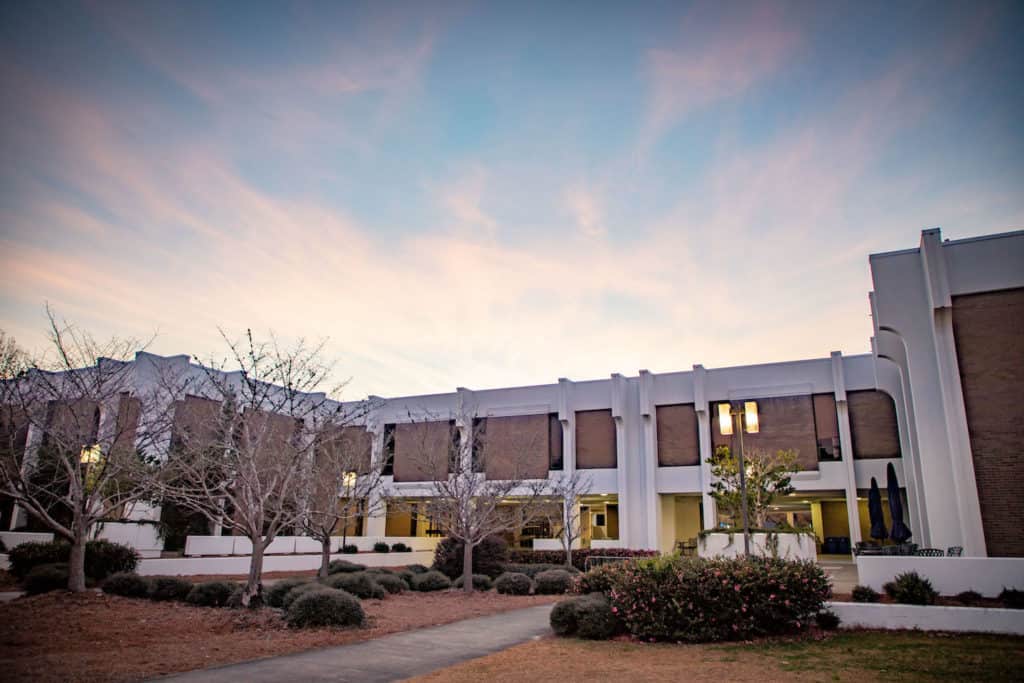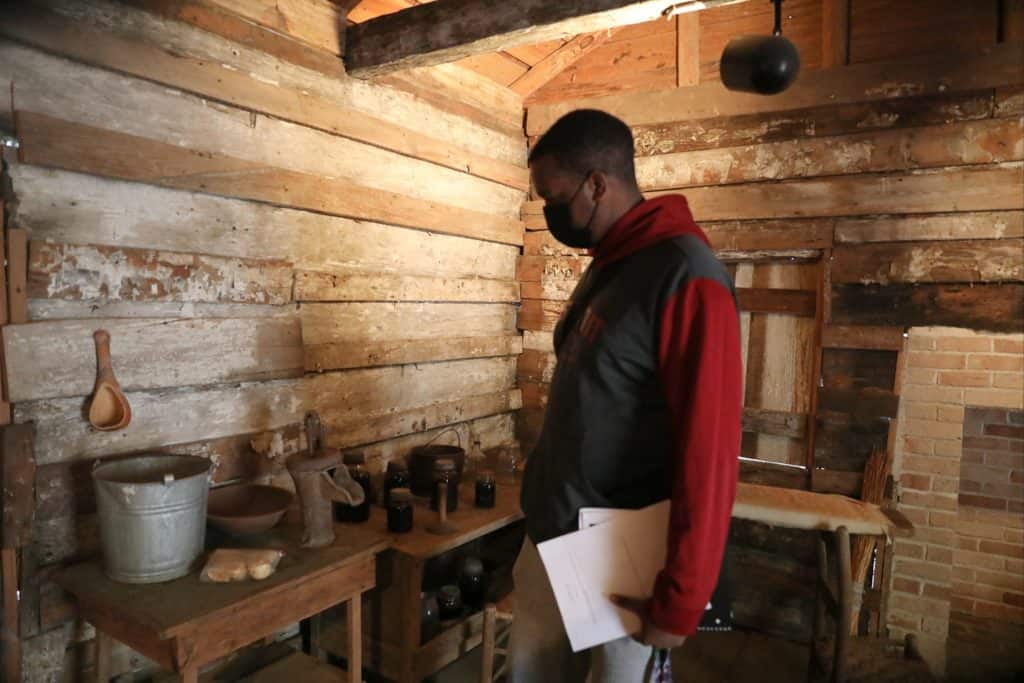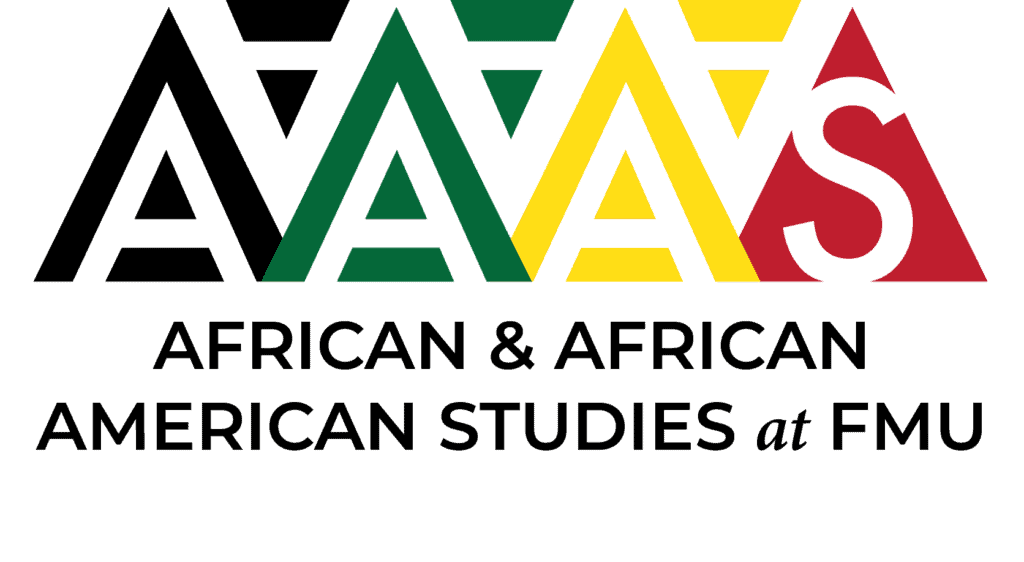African & African American Studies
Expand your worldview
The African and African American Studies (AAAS) program at Francis Marion University is designed to offer students an interdisciplinary and multifaceted approach to the study of people of African descent and their experiences in Africa, America, and the rest of the African Diaspora.
Through a minor or collateral and through extra-curricular offerings, the program allows students of all backgrounds to broaden their knowledge of the history and cultures of people of African descent, hone their skills of analysis and expression, and cultivate an ethic of human equality and social justice.
The program complements all majors in that it helps prepare students for the workplace and citizenship in a diverse country and an interconnected world.

African & African American Studies Minor
A minor in African & African American Studies consists of 18 hours of courses listed under the African & African American Studies to include AAAS 200, HIST 311 or HIST 370, and ENG 348, as well as 3 additional courses, with no more than two classes from any one discipline.
Special topics courses may also be counted for credit towards the program with the approval of the African American Studies Committee.
African & African American Studies Collateral
A collateral in African & African American Studies consists of 12 hours of courses listed under the African & African American Studies to include AAAS 200 and HIST 311, HIST 370, or ENG 348, as well as 2 additional courses, with no more than two classes from any one discipline.
Special topics courses may also be counted for credit towards the program with the approval of the African American Studies Committee.

Upcoming Events
Recent Events
ARTS INTERNATIONAL
Course Descriptions
200 Introduction to African American Studies
(3) Introductory survey course which provides an overview of the field of African American Studies from an interdisciplinary perspective.
201 Hip Hop: An American Story
(1), (2), or (3)(Prerequisite: AAAS 200 with grade of C or higher or permission of coordinator) In depth study of an area of interest related to Africa, African American experiences and/or other parts of the African diaspora. Different areas of study will be offered on a rotating basis during various semesters. May be taken up to two times (3 credit hours total) to count toward the program minor or collateral. May be taken for credit (3 hours) toward the Honors degree by special arrangement.
497 African and African American Studies: Special Studies
(3), (2), or (1) (Prerequisite: African American Studies 200 or permission of coordinator) Individual research project under the guidance of a faculty member. Research projects must be approved by the African and African American Studies Committee and are reviewed by three faculty members from two different disciplines. Open only to juniors and seniors with a grade point average of 3.0 or higher in their major courses. A maximum of three semester hours may be earned. May be taken for credit (three hours) toward the Honors degree by special arrangement.
ARTH 360: Islamic and African Art
Introduction to the traditional art forms of Western and Central Asia, North Africa, and Spain while under Islamic rule. The arts of Africa, especially Sub-Saharan, will also be covered by tribe and region.
ECON 323: Urban and Regional Economics
Study of the growth and development of urban and rural areas of the United States. Topics include industrial, agricultural, and business location; labor migration; urbanization; benefit-cost analysis; and regional objectives and policies.
ECON 410: Labor Economics
Examines the nature of the labor market and problems dealing with labor groups. Topics include history of the labor movement, union structures, labor law, and collective bargaining.
ENG 384: African-American Film History
Explores the history of African Americans in North American film and the specific contributions of African Americans to visual forms in narrative films. Chronologically follows the involvement of African Americans in film production, acting, directing, and distribution.
ENG 448: Advanced Study in African-American Literature
Focuses on major African-American writers, groups of writers, a genre, or a theme (e.g., Toni Morrison, the Harlem Renaissance). May be taken twice for academic credit with departmental approval.
HIST 311: History of Black America to 1865
HIST 312: History of Black America since 1865
HIST 313: The American Civil Rights Movement
HIST 316: South Carolina History
Survey of the history of the state from its founding to the present with emphasis on political, social, and economic developments and the changing attitudes prevalent among its citizenry. One 100-level history course or permission of department is prerequisite to all history courses above the 299 level.
HIST 344: The Old South, 1660 to 1865
Political, social, economic, and intellectual development of the Old South from its colonial beginning to its demise in the Civil War. Historiography of the period will also be covered. One 100-level history course or permission of department is prerequisite to all history courses above the 299 level.
HIST 345: The New South, 1865 to the Present
Transition of the Old South into the New South: the Reconstruction period and the South in the 20th century. One 100-level history course or permission of department is prerequisite to all history courses above the 299 level.
HIST 346: Civil War America
This course will examine the Civil War era in its broad cultural and social context beginning with a study of the divergent paths of the American people in the early 19th century and culminating in an examination of how the events of this era reshaped the understanding of concepts such as freedom, loyalty, and equality. A special emphasis will be placed on the interrelationship between battle front and home front. One 100-level history course or permission of the department is prerequisite to all history courses above the 299 level.
HIST 370: African History
Survey of the African continent from human origins to the present. Major topics include the emergence and development of agriculture, varieties of African political organization, the spread of Christianity and Islam, colonization and resistance, the African Diaspora, decolonization, and contemporary Africa, with emphasis on Africa in a global context. One 100-level history course or permission of the department is prerequisite to all history courses about the 299 level.
GEOG 306: Geography of Subsaharan Africa
Introductory analysis of the geography of Africa, with particular emphasis upon cultural diversity and social organization, environmental perception, agricultural systems, economic development, and political instability.
POL 311: Southern Politics
Examination of selected aspects of change and continuity in Southern politics from Reconstruction until the present.
POL 322: Civil Rights and Civil Liberties
Study of civil rights in the American constitutional context with emphasis on freedom of religion and expression, freedom of association, privacy rights, and protection against discrimination.
PSY 319: Social Psychology
(3) (Prerequisite: 206) F, S. An overview of classic and contemporary research in social psychology. A wide range of topics will be covered that relate to everyday social life drawn from the areas of attitudes and persuasion, social cognition and self-processes and interpersonal relationships.
SOC 306: Social Problems
Critical review of problems resulting from social inequality (distribution of wealth, racial and ethnic relations, gender relations, sexism, healthcare), violations of social norms (substance abuse, violence, and property crime), and social change (population growth, food, urbanization, environment).
SOC 310: Racial and Cultural Minorities
Survey of racial and cultural conflicts in contemporary civilization, theories of race and culture; the status of racial, religious, and ethnic minorities in the United States.
SOC 331: Environment, Power, and Opportunity
An introduction to the study of the relationship between human society and the physical environment, with an emphasis on the relationships among population growth, economic development, systems of inequality, and control and use of the natural environment. Local, regional, and global approaches will be used to understand environmental issues. An emphasis is placed on how the allocation of environmental resources (kind, amount, and quality) varies by race/ethnicity, gender, class, and nationality, and the different responses that these groups have to environmental problems/issues.
SOC 349: Hate Crimes and Terrorism
A critical examination of hate crimes and terrorism, including their similarities and differences, types of perpetrators and victims, perpetrator activities and tactics used, and societal impacts, as well as explanations for why these crimes occur and approaches used to impede these crimes. Major hate crime cases and terrorism incidents within the US and abroad are also reviewed.
SOC 382: Families Public and Private
Examines sociological theories used to study the family. Explores current and historic American family trends, how society and various social institutions shape the family, and the internal dynamics of the family as a social group in society.
SOC 407: Urban Sociology
Historical and current urban growth patterns, theoretical perspectives regarding urban structure and change, distribution of power and other resources in urban settings, urban cultural and social forms, problems of urban areas, and strategies of urban planning. The United States and other nations are examined. Explores how gender, racial/ethnic, class, gender, age, nationality, and other group relations affect urban processes and life. A student research project involving secondary data analysis and an oral presentation of the project are required.
SOC 419: Population and Society
Scientific study of population size, composition and distribution; analysis of trends and differentials in birth rates, death rates, and migration by race/ethnicity, gender, class, age, and nationality; consideration of actual and potential pressures of population on natural resources; the interrelationship of population and the social structure as it varies by race/ethnicity, class, gender, age, and nationality. A student research project involving secondary data analysis and an oral presentation of the project are required.
Spring 2022
HIST 318: The Historical Focus
In-depth study of one historical subject emphasizing interpretations, bibliographies, and historiography and utilizing the historical method. One 200-level history course or permission of department is prerequisite to all history courses above the 299 level. May be taken twice for academic credit with departmental approval.
HNRS 253H: Urban Geography and SciFi
More than half of all humans live in cities, and the number of people living in urban spaces is expected to continue increasing. For this reason, cities are the future of human societies. They are centers of influence and innovation, where different cultures, economies, and politics interact, merge, and diverge. Cities are also centers of incredible inequality, with patterns of extreme wealth and poverty showing the overwhelming possibility and struggle of the human experience. This course examines urban phenomena in order to understand the various ways that urban spaces are imagined, designed, and experienced. To do this, the course examines geographic approaches to urban design and structure, and uses Science Fiction literature to explore the relationship between urban imaginations and urban realities. Through this analysis, students will gain insight into the various futures that cities may hold.
HNRS 262 Clergy, Concubines, Corsairs
HNRS 264H: Independent Black Cinema
This film studies course explores the widest possible variety of Independent Black Cinema from the beginning of American film history to the present. This cinema does not respect the rules and boundaries set by conventional narrative film, and we will follow them out of bounds to Ibo Landing, Martinique, Cuba, and Ghana. The course trains students to analyze conventional film form in order to understand how Independent Black Cinema perverts, confronts, and replaces that form. All of these films are transgressive, and some are avant-garde, new wave, or retro.
HNRS 267H: History of Afro-Latin Dance & Music
Description not available at this time.

